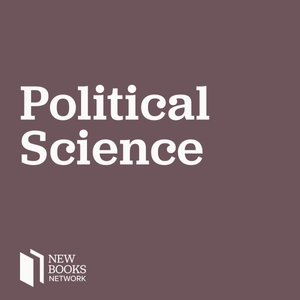
Why are spices delicious?
10/13/23 • 27 min
1 Listener
CrowdScience listener Kristine from Wisconsin in the USA wants to know why herbs and spices taste so good to so many of us. She’s intrigued to know if there's evidence that herbs and spices can keep us healthy.
Anand Jagatia visits the historic naval city of Portsmouth in the UK, where exotic spices from around the world were first brought in from the East Asia more than 600 years ago.
He’s on a journey to find out why many of us think spices are delicious. But are there also nutritional benefits to seasoning our food with them? Anand asks what science or studies are there to show that eating herbs and spices can be beneficial for our health?
Presenter: Anand Jagatia Producer: Joanna Hall Assistant Producer: Jonathan Harris Editor: Richard Collings Studio Technicians: Bob Nettles & Steve Greenwood
Contributors:
Prof. Lindell Bromham, evolutionary biologist, Australian National University Dr. Kanchan Koya, Molecular Biologist and founder of the Spice Spice Baby website Dr. Beronda L. Montgomery, plant biologist and Dean at Grinnell College, Iowa, USA Dr. Lorenzo Stafford an olfactory researcher, Department of Psychology, University of Portsmouth, UK
(Photo: A couple stand at a spice shop. Credit: Thomas Barwick / Getty Images)
CrowdScience listener Kristine from Wisconsin in the USA wants to know why herbs and spices taste so good to so many of us. She’s intrigued to know if there's evidence that herbs and spices can keep us healthy.
Anand Jagatia visits the historic naval city of Portsmouth in the UK, where exotic spices from around the world were first brought in from the East Asia more than 600 years ago.
He’s on a journey to find out why many of us think spices are delicious. But are there also nutritional benefits to seasoning our food with them? Anand asks what science or studies are there to show that eating herbs and spices can be beneficial for our health?
Presenter: Anand Jagatia Producer: Joanna Hall Assistant Producer: Jonathan Harris Editor: Richard Collings Studio Technicians: Bob Nettles & Steve Greenwood
Contributors:
Prof. Lindell Bromham, evolutionary biologist, Australian National University Dr. Kanchan Koya, Molecular Biologist and founder of the Spice Spice Baby website Dr. Beronda L. Montgomery, plant biologist and Dean at Grinnell College, Iowa, USA Dr. Lorenzo Stafford an olfactory researcher, Department of Psychology, University of Portsmouth, UK
(Photo: A couple stand at a spice shop. Credit: Thomas Barwick / Getty Images)
Previous Episode

Can humans be part of healthy ecosystems?
Humans have an outsized impact on the planet: we’ve wreaked havoc on countless ecosystems and one study estimates only 3% of land on Earth remains untouched by our influence. CrowdScience listener Teri has witnessed the harmful effects of development on natural habitats near her home, and wonders whether we can ever function as part of a healthy ecosystem.
We look for answers in Teri’s home state, California. Humans have lived here for over 10,000 years and its first inhabitants formed a connection to their landscape unlike the exploitative approach of many later settlers. Today, the beliefs and traditions of the Karuk Tribe of northern California still emphasise a symbiotic relationship with nature, seeing plants and animals as their relations.
Over the past couple of centuries much of the Karuk’s land has been degraded by mining, the timber industry and the outlawing of traditional burning practices. Tribal members show us how they’re working to try to restore ecological balance.
As for the rest of humanity: can we rein in our destructive relationship to nature; or even have a beneficial effect on our local ecosystems?
Contributors:
Kathy McCovey - Karuk Tribe member and cultural practitioner Dr Steward Pickett - Ecologist, Cary Institute of Ecosystem Studies Bill Tripp - Karuk Tribe member and Director of Natural Resources and Environmental Policy, Karuk Tribe Department of Natural Resources Dr Frank Kanawha Lake - US Forest Service Research Ecologist and Tribal Liaison Will Harling - Co-lead, Western Klamath Restoration Partnership
Presenter: Caroline Steel Producer: Cathy Edwards Editor: Richard Collings Production Co-ordinator: Jonathan Harris Studio Manager: Giles Aspen & Steve Greenwood
(Image: Huckleberries and tanoak acorns gathered near a burn site. Credit: Stormy Staats)
Next Episode

Which is healthier, farmed or wild salmon?
Salmon are one of the world’s most popular fish. And - in terms of the size of the industry - they’re also the world’s most valuable. They provide crucial proteins and fatty acids to many people’s diets. But like other species of fish, their production is undergoing a historic change. Plenty of salmon is still caught from the wild, but the majority is now farmed off the coasts of countries like Norway or Chile. With global demand on the rise, listener Jodie from Australia wants to know: which is healthier, farmed salmon or wild?
CrowdScience’s Marnie Chesterton is on the case! Her first stop: a remote loch in the west of Scotland, where salmon company Mowi rears thousands of the fish in big, open-water nets. Marnie takes the chance to see for herself what salmon farming actually looks like. She then speaks to aquaculture nutritionist Stefanie Colombo, who researches the nutrient content of different types of salmon. Stefanie breaks down the health positives and negatives of each, as well as what causes some of these differences.
Crucially, farmed salmon will vary in nutrition depending on where you are in the world. Jodie, the listener who asked this week’s question, is from Australia so her fish will most likely come from Tasmania. Chemist Christian Narkowicz has been conducting chemical tests on the salmon there - he tells Marnie what he’s found.
When we ask which type of salmon is healthier, it’s also important to consider the issue of environmental health. Eilís Lawlor is an economist and the author of a report on externalities and unintended consequences of the global salmon industry. She and Marnie discuss problems of overfishing and environmental pollution.
It’s also necessary to understand where wild salmon comes from. Marissa Wilson, director of the Alaska Marine Conservation Council, explains her average day out at sea and talks about some of the consequences of industrial offshore fishing.
Finally, we ask if there’s a way to improve farmed salmon by moving it onto land? That’s Yonathan Zohar’s mission. In the basement of the Institute for Marine and Environmental Technology in Baltimore, USA, he keeps several tanks of salmon in artificial seawater, using bacteria to dispose of the waste. Is this where salmon farming is headed? Or is the future more complex?
Presenter: Marnie Chesterton Producer: Phil Sansom Production Co-ordinator: Jonathan Harris Editor: Richard Collings
(Photo: Atlantic Salmon jumping out of the water. Credit: Kevin Wells / Getty Images)
If you like this episode you’ll love
Episode Comments
Featured in these lists
Generate a badge
Get a badge for your website that links back to this episode
<a href="https://goodpods.com/podcasts/crowdscience-272882/why-are-spices-delicious-34886953"> <img src="https://storage.googleapis.com/goodpods-images-bucket/badges/generic-badge-1.svg" alt="listen to why are spices delicious? on goodpods" style="width: 225px" /> </a>
Copy





